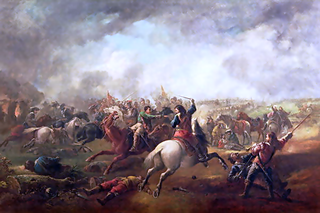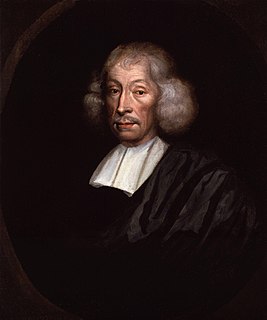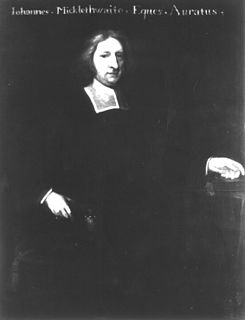Life
He was the son of John Skinner of London. He matriculated at Christ Church, Oxford, on 6 December 1639; but when the First English Civil War broke out, he left England. [1]

Christ Church is a constituent college of the University of Oxford in England. Christ Church is a joint foundation of the college and the Cathedral of the Oxford diocese, which serves as the college chapel and whose dean is ex officio the college head.

The First English Civil War (1642–1646) began the series of three wars known as the English Civil War. "The English Civil War" was a series of armed conflicts and political machinations that took place between Parliamentarians and Royalists from 1642 until 1651, and includes the Second English Civil War (1648–1649) and the Third English Civil War (1649–1651). The wars in England were part of the Wars of the Three Kingdoms, being fought contemporaneously with equivalents in Scotland and Ireland. Many castles and high-status homes such as Lathom House were slighted during or after the conflict.
In 1646 Skinner was again at Oxford, and in consideration of his foreign service he was allowed to accumulate both his arts degrees in that same year, graduating B.A. on 21 October and M.A. on 10 November. On 22 April 1649 he entered as a medical student at Leiden University, on 6 May 1653 at the University of Heidelberg, and on 4 November 1653 was again at Leyden. At the beginning of 1654 he graduated M.D. at Heidelberg, and on 26 May of that year was incorporated in the same degree at Oxford. [1]

Leiden University, founded in the city of Leiden, is the oldest university in the Netherlands. The university was founded in 1575 by William, Prince of Orange, leader of the Dutch Revolt in the Eighty Years' War. The Dutch Royal Family and Leiden University have a close association: Queen Juliana, Queen Beatrix and King Willem-Alexander are former students. The university came into particular prominence during the Dutch Golden Age, when scholars from around Europe were attracted to the Dutch Republic due to its climate of intellectual tolerance and Leiden's international reputation. During this time Leiden was home to such figures as René Descartes, Rembrandt, Christiaan Huygens, Hugo Grotius, Baruch Spinoza and Baron d'Holbach.
Skinner was made honorary fellow of the London College of Physicians in December 1664. He practised in Lincoln where he died of malignant fever on 5 September 1667. Administration of his estate was granted to his sister, Elizabeth Bowyer, and his daughter Stephanie Skinner, on 7 September 1667. [1]

The Royal College of Physicians is a British professional body dedicated to improving the practice of medicine, chiefly through the accreditation of physicians by examination. Founded in 1518, it set the first international standard in the classification of diseases, and its library contains medical texts of great historical interest.







